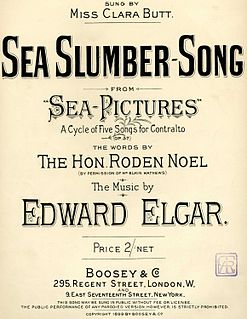"Land of Hope and Glory" is a British patriotic song, with music by Edward Elgar written in 1901 and lyrics by A. C. Benson later added in 1902.

"America " is an American patriotic song, the lyrics of which were written by Samuel Francis Smith. The melody used is the same as that of the national anthem of the United Kingdom, "God Save the Queen". The song served as one of the de facto national anthems of the United States before the adoption of "The Star-Spangled Banner" as the official U.S. national anthem in 1931.
Sea Pictures, Op. 37 is a song cycle by Sir Edward Elgar consisting of five songs written by various poets. It was set for contralto and orchestra, though a distinct version for piano was often performed by Elgar. Many mezzo-sopranos have sung the piece.

In Haven (Capri) is a poem by Caroline Alice Elgar, probably best known in its musical setting as the second song composed by her husband Edward Elgar for his song-cycle Sea Pictures.
"The Swimmer" is a poem by the Australian poet Adam Lindsay Gordon. The poem is from his last volume of poems Bush Ballads and Galloping Rhymes published in 1870, when he was living at Melbourne. In The Poems of Adam Lindsay Gordon, it is grouped among "Poems Swinburnian in Form and Pessimism, but full of the Personality of Gordon."

"Sea Slumber Song" is a 19th-century poem by Roden Noel set to music by Sir Edward Elgar as the first song in his song-cycle Sea Pictures (1899).
"Sabbath Morning at Sea" is a poem by Elizabeth Barrett Browning first published in 1839, which Sir Edward Elgar set to music in 1899 as the third song in his song-cycle Sea Pictures.
Was it some Golden Star? is a poem written by Gilbert Parker, published in Volume I of a series of poems called Embers. It was set to music by the English composer Edward Elgar in 1910, as his Op. 59, No. 5.
Oh, soft was the song is a song with words by Gilbert Parker set to music by the English composer Edward Elgar in 1910, as his Op. 59, No. 3. It is the second and last verse of a poem At Sea which Parker published in Volume I of a series of poems called Embers. The Opus 59 songs were part of a song-cycle of six romantic songs by Parker that was never completed – Nos 1, 2 and 4 were never composed. The other songs were Was it some Golden Star? and Twilight. The songs were originally written with piano accompaniment, but this was later re-scored by the composer for full orchestra.
"The Language of Flowers" is an unpublished song from a poem by the American geologist and poet James Gates Percival, with music written by the English composer Edward Elgar when he was only fourteen years old.

Speak, Music! is a song written by the English composer Edward Elgar in 1901 as his Op.41, No.2.
"Follow the Colours" is a marching song written by the English composer Edward Elgar in 1907, with words by Capt. William de Courcy Stretton. The song is for solo voice with an optional chorus of male voices.
"A Song in Storm" is a poem written by Rudyard Kipling (1865-1936).
"The Sweepers" is a poem written by Rudyard Kipling (1865-1936), and set to music by the English composer Edward Elgar in 1917, as the fourth of a set of four war-related songs on nautical subjects for which he chose the title "The Fringes of the Fleet".
"Submarines" is a poem written by Rudyard Kipling (1865-1936), and set to music by the English composer Edward Elgar in 1917, as the third of a set of four war-related songs on nautical subjects for which he chose the title "The Fringes of the Fleet".

The Fringes of the Fleet is a booklet written in 1915 by Rudyard Kipling (1865–1936). The booklet contains essays and poems about nautical subjects in World War I.

"In Moonlight" is a song with music written by the English composer Edward Elgar in 1904 to words from the poem "An Ariette for Music. To a Lady singing to her Accompaniment on the Guitar", by Percy Bysshe Shelley (1792-1822) and published in 1832.
Pageant of Empire is the title given to a set of songs, to words by Alfred Noyes, written by the English composer Sir Edward Elgar and given important positions in the Pageant of Empire at the British Empire Exhibition at Wembley Park.

Caroline Alice, Lady Elgar was an English author of verse and prose fiction, who married the composer Edward Elgar.
"Big Steamers" is a poem by Rudyard Kipling, first published in 1911 as one of his twenty-three poems written specially for C. R. L. Fletcher's "A School History of England". It appears in the last chapter of the book. It is intended for children, with the verses responding with facts and humour to their curiosity about the 'big steamers' - as the merchant ships are called.







